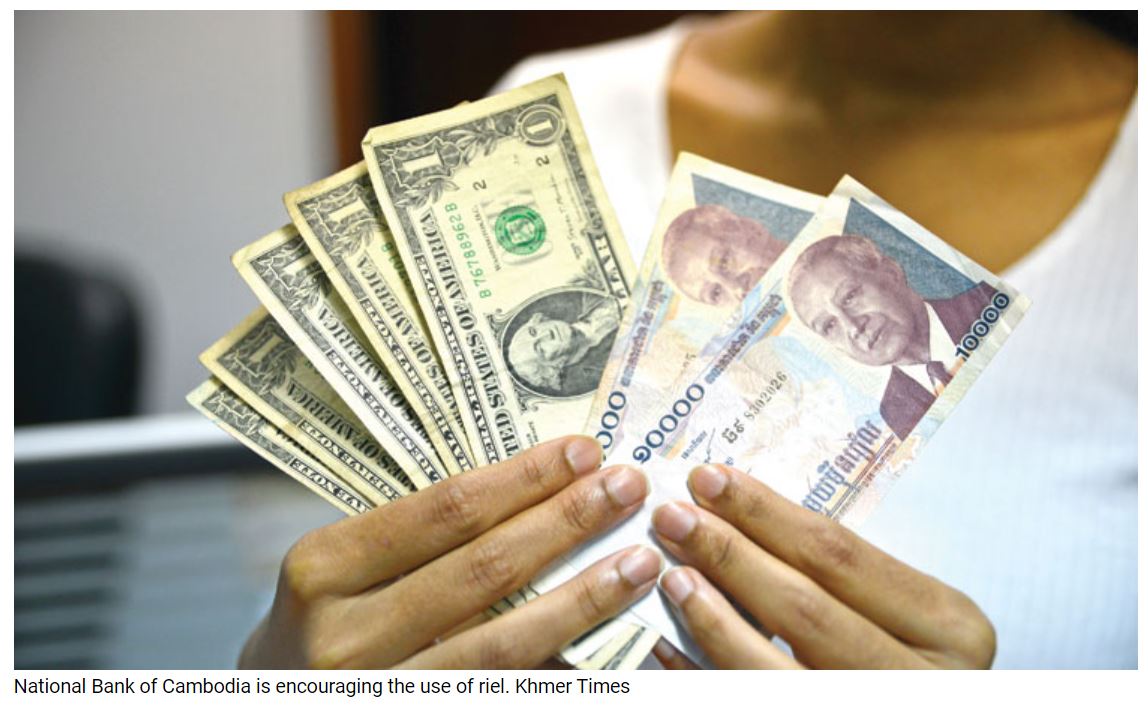Cambodia: Kingdom not worried of riel’s dependency, says PM
Prime Minister Hun Sen yesterday said that the dependency of riel on foreign currencies is not a big issue, even though their circulation in the economy has experienced some minor impacts from the financial or economic crises that have happened in the regional and global contexts recently.
He made these remarks while interacting with more than 18,000 factory workers from Por Senchey district of Phnom Penh to check out the status of implementing the policies that the government set for the industry’s labour force such as additional benefits that workers have been offered by the National Social Security Fund (NSSF).
Cambodia has not faced a shortage of dollars in its economy as the government has allowed enterprise owners to pay wages in foreign currencies to their employees not only to avoid monetary losses but also to assure that the purchasing power of the people is not reduced due to fluctuating exchange rate in the currency market, the PM said.
The Premier went on to say that even though Cambodia has put its efforts to promote using of riel among people, vendors, businesspeople, investors and public servants in private and public institutions to increase its national currency’s independency, its dependency has still provided them and the economy as a whole with the remarkable economic advantages.
“We do not have to get stuck by being afraid that our national currency is dependent if we use foreign currencies. This might not be a reasonable thought as the previous economic impacts … have been small on our country,” said Prime Minister Hun Sen, adding that Cambodia has allowed both its national currency and foreign currencies to be circulated in its economy.
Mr Hun Sen claimed that the Asian Financial Crisis 1997-1998 slightly affected Cambodia’s economy as at that time the government also allowed riel and foreign currencies to be circulated in the economy. “I said at that time that when the height we jump is not high, we would not get seriously injured when falling down, while our economy was so small,” he said.
He said that the global financial crisis of 2008-2009 also had slight inflationary pressure on Cambodia as the payments in its economy were able to be made in different currencies and the current crises—Covid-19, Russia-Ukraine war and unilateral sanctions—have affected the economies in the world such as rocketing inflation.
“However, the purchasing power of our workers is still well maintained here. Taking measures, we have tried to increase salary and curbing the prices of commodities from rising much to a level as low as possible,” said Mr Hun Sen, adding that the oil price in the international market has fallen to $72.37 per barrel at the time he was speaking yesterday.
“It is a good price … the government has tracked the price seriously,” said Prime Minister Hun Sen, adding that the price has fallen remarkably from approximately $86 or $87 per barrel during the Khmer New Year 2023, while discounted prices have been offered to oil consumers in Cambodia and the prices of electricity and water have also been stable.
The Economic and Monetary Statistics Bulletin for February 2023 released yesterday by National Bank of Cambodia (NBC) showed that the inflation in Cambodia’s economy has fallen down to 2.2 percent in February this year from approximately 3 percent in January on its downtrend annual basis since June 2022 after the uptrend from early 2021 to May 2022.
“The consumer price index that has fallen down on an annual basis reflects mainly the falling of the fuel prices and the slower rising price of food,” the central bank’s Economic and Monetary Statistics Bulletin pointed out, adding that the price of regular gasoline has dropped 4.3 percent in February 2023 compared to the same month of the previous year.
Source: https://www.khmertimeskh.com/501315917/kingdom-not-worried-of-riels-dependency-says-pm/


 Thailand
Thailand




